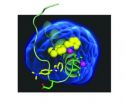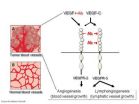(Press-News.org) ANN ARBOR, Mich.---New molecular tools developed at the University of Michigan show promise for "cleansing" the brain of amyloid plaques, implicated in Alzheimer's disease.
A hallmark of Alzheimer's disease---a neurodegenerative disease with no cure---is the aggregation of protein-like bits known as amyloid-beta peptides into clumps in the brain called plaques. These plaques and their intermediate messes can cause cell death, leading to the disease's devastating symptoms of memory loss and other mental difficulties.
The mechanisms responsible for the formation of these misfolded proteins and their associations with Alzheimer's disease are not entirely understood, but it's thought that copper and zinc ions are somehow involved.
The research, led by assistant professor Mi Hee Lim, was published online Dec. 3 in the Proceedings of the National Academy of Sciences.
In earlier work, Lim and her team developed dual-purpose molecular tools that both grab metal ions and interact with amyloid-beta. The researchers went on to show that in solutions with or without living cells, the molecules were able to regulate copper-induced amyloid-beta aggregation, not only disrupting the formation of clumps, but also breaking up clumps that already had formed.
Building upon that first generation of compounds, Lim and lab members Jung-Suk Choi and Joseph Braymer now report a second generation of compounds that are more stable in biological environments. The researchers tested one of those compounds, described in the PNAS paper, in homogenized brain tissue samples from Alzheimer's disease patients.
"We found that our compound is capable of disassembling the misfolded amyloid clumps to form smaller amyloid pieces, which might be 'cleansed' from the brain more easily, demonstrating a therapeutic application of our compound," said Lim, who has joint appointments in the Life Sciences Institute and the Department of Chemistry. In addition, preliminary tests show that the bi-functional small molecules have a strong potential to cross the blood-brain barrier, the barricade of cells that separates brain tissue from circulating blood, protecting the brain from harmful substances in the bloodstream.
"Crossing this barrier is essential for any treatment like this to be successful," Lim said.
Next steps include more intensive testing of the new compounds for diagnostic and therapeutic properties.
INFORMATION:
Lim and her team collaborated with Ayyalusamy Ramamoorthy, professor of chemistry and biophysics on this work, with funding from the U-M Horace H. Rackham School of Graduate Studies, the Alzheimer's Art Quilt Initiative, and the National Institutes of Health.
Read the article:
http://www.pnas.org/content/early/2010/12/02/1006091107.full.pdf+html?sid=5e3348f1-8fa4-4e0a-ba07-573098113c9a
Visit the Lim lab: http://www.lsi.umich.edu/facultyresearch/labs/lim
Unraveling Alzheimer's: Simple small molecules could untangle complex disease
2010-12-10
ELSE PRESS RELEASES FROM THIS DATE:
2 decades of Nuss procedure outcomes: Refinements in groundbreaking surgery for chest deformity
2010-12-10
Since 1987, when a surgeon at Children's Hospital of The King's Daughters developed a minimally-invasive surgery to correct sunken chest, the procedure has been adopted world-wide as a standard of care and continually refined to increase its effectiveness and safety, according to a paper published in the December issue of the Annals of Surgery.
Coming more than two decades after the procedure was developed by surgeon Donald Nuss, the article summarizes the cases of 1,215 patients who had the Nuss Procedure at Children's Hospital of The King's Daughters and focuses on ...
Patients may not have to stop taking anti-platelets for some surgeries
2010-12-10
Despite the common clinical practice among surgeons to discontinue their patients' anti-platelet therapy prior to surgery, a recent study of patients undergoing carotid endarterectomy (CEA) indicated that this practice may be unnecessary. The study will be published in the December issue of the Annals of Vascular Surgery.
The use of clopidogrel (Plavix, Bristol-Myers Squibb/Sanofi-Aventis), an antiplatelet agent prescribed for patients with acute myocardial infarction (severe heart attack), recent stroke or peripheral arterial disease, continues to rise with U.S. sales ...
UCLA researchers find that Medicaid-funded ADHD treatment for children is failing
2010-12-10
Whatever its final incarnation, the recently enacted landmark Patient Protection and Affordable Care Act will expand Medicaid eligibility and is expected by 2013 to provide coverage, including mental health care, to an estimated 4.1 million children currently uninsured.
That's a good thing. But what will the quality of care be, especially for vulnerable children with special health care needs? Poor, according to a new report in the current online edition of the Journal of the American Academy of Child and Adolescent Psychiatry.
In cooperation with LA Care, one of ...
Fox Chase researchers uncover new risk factors for brain metastases in breast cancer patients
2010-12-10
SAN ANTONIO, TEX. (December 9, 2010)––Nearly one-fifth of all metastatic breast cancer patients develop brain metastases and have significantly shorter overall survival than patients who do not have brain involvement. One way to improve the affected patients' survival might be to prevent the brain metastases from arising in the first place. With that in mind, researchers have been working on a predictive model that accurately identifies these high risk patients. Now, Veeraiah Siripurapu, M.D., and colleagues from Fox Chase Cancer Center have verified several factors––including ...
Web of international collaboration boosts worldwide nanotechnology research
2010-12-10
Despite their initial focus on national economic competitiveness, the nanotechnology research initiatives now funded by more than 60 countries have become increasingly collaborative, with nearly a quarter of all papers co-authored by researchers across borders.
Researchers from the two leading producers of nanotechnology papers – China and the United States – have become each nation's most frequent international co-authors. Though Chinese and U.S. researchers now publish roughly the same number of nanotechnology papers, the U.S. retains a lead in the quality of publications ...
A double block of blood vessels to starve cancerous tumors
2010-12-10
A novel strategy of blocking the growth of blood vessels with antibodies should result in improved treatment of cancerous tumors.
The growth of new blood vessels from pre-existing vasculature is called angiogenesis. In adults, angiogenesis occurs only during wound healing and menstrual cycling, but is abundant and harmful in cancerous tumors and the old-age eye disease frequently leading to blindness called age-related macular degeneration (AMD). Without the formation of new blood vessels, tumors cannot grow beyond a small size due to lack of oxygen and nutrients. Inhibition ...
ACP commends Congress for preserving patient access by stopping scheduled Medicare SGR cuts
2010-12-10
(Washington) – The American College of Physicians (ACP) today commended Congress for taking bipartisan action to preserve access for patients enrolled in Medicare and TriCare by stabilizing physician payments through 2011. The College noted, though, that the incoming 112th Congress will need to enact legislation to provide longer-term stability in payments and lead to repeal of the Sustainable Growth Rate (SGR) formula.
The legislation, passed unanimously by the Senate yesterday and passed by an overwhelming majority in the House of Representatives today, will avert ...
Ice-age reptile extinctions provide a glimpse of likely responses to human-caused climate change
2010-12-10
ANN ARBOR, Mich.---A wave of reptile extinctions on the Greek islands over the past 15,000 years may offer a preview of the way plants and animals will respond as the world rapidly warms due to human-caused climate change, according to a University of Michigan ecologist and his colleagues.
The Greek island extinctions also highlight the critical importance of preserving habitat corridors that will enable plants and animals to migrate in response to climate change, thereby maximizing their chances of survival.
As the climate warmed at the tail end of the last ice age, ...
Blood-thinning treatment standards changing for heart patients, new research shows
2010-12-10
CINCINNATI—Researchers at the University of Cincinnati (UC) and Massachusetts General Hospital have found that warfarin, a known anticoagulation (blood-thinning) drug, may not be as beneficial to some patients with atrial fibrillation as previously thought.
These findings were published online this week ahead of print in the journal Circulation: Cardiovascular Quality and Outcomes.
Warfarin is commonly prescribed to prevent blood clotting, particularly for patients with atrial fibrillation—a type of abnormal heart rhythm.
Mark Eckman, MD, professor of medicine at ...
Medicine: Alzheimer's and heart attacks share the same genes
2010-12-10
Alzheimer and heart attacks have been found to share common genetic basis. The research leads the way to the first genetic test on developing the risk of the diseases even at a young age. According to Federico Licastro, an immunologist at the University of Bologna who coordinated the study published in the scientific journal, Journal of Alzheimer's Disease, a test is now ready. "They are already selling it in America", he says, citing the case of a private firm in New Mexico (USA) that collaborated on the study. "But the tests could easily be also conducted wherever, using ...



